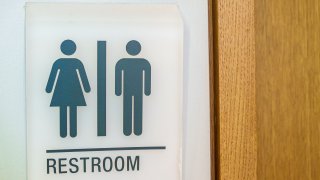
Charlotte, North Carolina, restroom coed unisex gender neutral.
Utah is poised to become the next state to regulate bathroom access for transgender people after its Republican-controlled Legislature passed a measure Friday that requires people to use bathrooms and locker rooms in public schools and government-owned buildings that match their sex assigned at birth.
Transgender people can defend themselves against a complaint that they are in the wrong bathroom by proving they had gender-affirming surgery and changed the sex on their birth certificate, under the legislation. Opponents noted that not all states allow people to change their birth certificates and many trans people don't want to have surgery.
WATCH ANYTIME FOR FREE
Stream NBC10 Boston news for free, 24/7, wherever you are. |
The measure now awaits a decision by Republican Gov. Spencer Cox, who has not said whether he will sign it. His office did not immediately respond to an email seeking comment Friday.
The legislation also requires schools to create “privacy plans” for trans students and others that may not be comfortable using group bathrooms, for instance by allowing them to use a faculty bathroom — something opponents say may “out” transgender children.
Get updates on what's happening in Boston to your inbox. Sign up for our News Headlines newsletter.
At least 10 other states — Alabama, Arkansas, Florida, Idaho, Iowa, Kansas, Kentucky, North Dakota, Oklahoma and Tennessee — have passed laws that seek to regulate which bathrooms trans people can use and nine states regulate the bathrooms that trans students can use at school. West Virginia's legislature is considering a transgender bathroom bill for school students this year.
Federal appeals courts are divided over whether school policies enforcing restrictions on which bathrooms transgender students can use violate federal law or the Constitution. The U.S. Supreme Court recently declined to consider an appeal of a ruling by the 7th U.S. Circuit Court of Appeals upholding an order granting transgender boys access to the boys’ bathroom at a school in Indiana.
The Utah bill requires any new government buildings to include single occupancy bathrooms and asks that the state consider adding more single occupancy bathrooms to increase privacy protections in existing government buildings. It did not provide any funding for such upgrades.
U.S. & World
The sponsor, Republican Rep. Kera Birkeland, said she was trying to make it illegal for a naked man to be in a bathroom with an 8-year-old girl. She said that situation happened at a public facility in Salt Lake County and officials said they couldn’t do anything about it because the man said he was trans.
Opponents argued the legislation should target the behavior and not transgender residents and visitors.
“It seems more like a creepy men in bathrooms issue” than an issue of gender identity, Republican Sen. Todd Weiler said during a committee hearing.
The bill was amended to target the behaviors of lewdness, voyeurism and trespassing in bathrooms, but opponents note it still would require a trans man who was taking testosterone and may have even grown a beard to use the women's bathroom.
The ACLU of Utah held a rally in opposition to the bill at the Utah Capitol on Thursday. One person carried a sign that said: “It's not about bathrooms just like it was never about water fountains,” referring to racial segregation in the 1960s.
Trans and nonbinary people “are part of our communities and deserve freedom from constant political attacks,” Aaron Welcher, spokesperson for the ACLU of Utah, said in a statement Friday.
“With each disruption to the rights of Transgender Utahns — in healthcare, sports, identification, and now public spaces — we will use every means available, including legal action when necessary, to defend their civil rights and liberties from powerful policymakers infringing on these freedoms,” he said.
The Senate sponsor, Sen. Dan McKay, read a list of news stories about sexual assaults and rapes that have happened in bathrooms around the country, and even one in Paris, arguing Thursday that those incidents demonstrated the need for the bill.
Republican Sen. Daniel Thatcher asked if any of the perpetrators in those cases were transgender. McKay said the news stories did not say.
Democratic Rep. Jennifer Plumb, who is a pediatrician, said she felt like she failed in getting across to her fellow lawmakers “that perverts and pedophiles and the disgusting folks who do things to our kiddos — many of which I see as victims in the ER — are not the same as our trans community. We need to work very hard to keep that distinction alive.”
The bill passed easily in both the House and Senate Friday after a conference committee clarified that public school students cannot be charged criminally for using the bathroom that matches their gender identity, a change that was requested by Equality Utah, a nonprofit organization that advocates for LGBTQ+ rights.
Equality Utah said it still believes that “transgender Americans have the freedom and liberty to access facilities in public spaces.”
No lawmakers or members of the public spoke against the part of the bill that allows the state to enforce some federal Title IX provisions that require equal opportunities for male and female athletes in schools, along with equal facilities and equal access to preferred playing and practice times.



